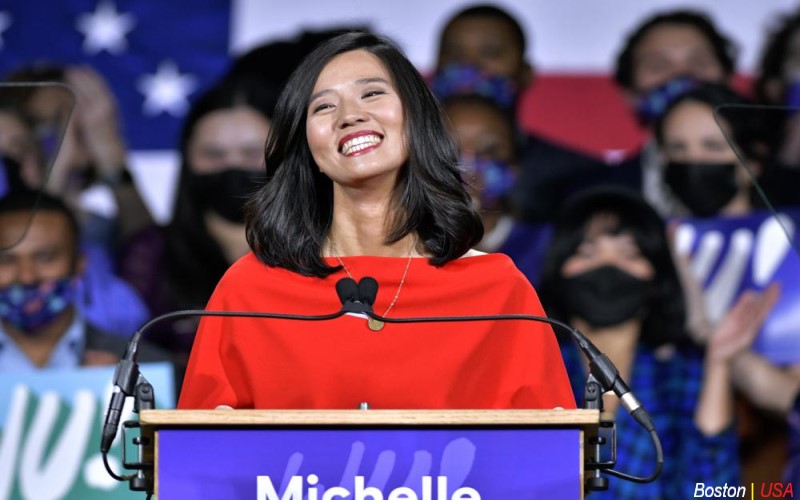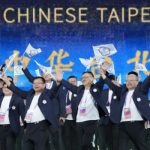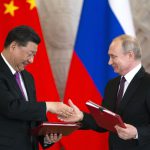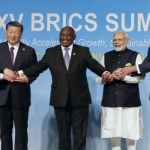
WASHINGTON, United States (AP ) — Asian Americans will serve as mayor in Boston and Cincinnati for the first time in both cities’ histories, signaling political progress for a population that has struggled for almost two years with a rise in anti-Asian hate.
Boston voters tapped City Councilor Michelle Wu, 36, on Tuesday to serve in the city’s top political office. In Cincinnati, Aftab Pureval, 39, easily defeated former Democratic Congressman David Mann.
“Tonight, we made history in Cincinnati,” Pureval told a large gathering of supporters. “Cincinnati is a place where no matter what you look like, where you’re from, or how much money you have, if you come here and work hard you can achieve your dreams.”
When Pureval decided to leave his attorney job in 2015 to run for county clerk, it was some fellow Democrats who warned him against the idea. They felt he didn’t have a “good ballot name” that would appeal to the predominantly white votership in Hamilton County, Ohio.
“When you see A-f-t-a-b on a yard sign, it doesn’t occur to people that’s a candidate not an insurance company,” Pureval told The Associated Press earlier in the day. “When you’re Asian, when you have an ethnic name, it’s just harder. You’ve got to be creative, you’ve got to work harder, you’ve got to knock on more doors.”
Pureval, the son of a Tibetan mother and Indian father, must have knocked on enough doors. He went on to score a major upset, becoming the first Democrat in over 100 years to be elected clerk.
Meanwhile, in Seattle, Bruce Harrell, who is second-generation Japanese American and Black, was ahead of current City Council President M. Lorena González. But, it could be days before there’s a clear winner.
What’s extraordinary is how spread out the three cities are. High-profile mayors who are Asian American and Pacific Islander, also known as AAPI, have typically been elected in places with historically large Asian populations like California and Hawaii. These candidacies signal just how large the AAPI electorate has multiplied with more feeling empowered to be a voice in the political fray.
The wider implications of his mayoral victory in a city with a small AAPI community mean a great deal to Pureval, who says his election “will show not just that AAPIs can run and win on the coasts or where there’s large Asian populations, but that AAPIs can run and win anywhere.”
Wu, 36, Boston’s first Asian American city councilor, beat fellow city councilor Annissa Essaibi George, 47, an Arab Polish American. Wu, who is Taiwanese American, was the favorite especially after getting a coveted endorsement from acting mayor Kim Janey, who was elevated to the post when the former mayor resigned. Janey was the city’s first Black and first female mayor.
Harrell, 63, became Seattle’s first Asian American mayor by appointment in 2017 after Mayor Ed Murray resigned over child sex abuse allegations. Less than a week in, Harrell decided to continue serving on the City Council instead.
In another notable win Tuesday, Dearborn, Michigan, elected state lawmaker Abdullah Hammoud as the city’s first Arab American mayor. A final unofficial vote count showed him in an insurmountable lead ahead of Gary Woronchak, a former state representative. Dearborn, a city of over 100,000, has one of the largest Arab American populations in the nation.
The AAPI Victory Fund, a Super PAC that mobilizes eligible Asian American and Pacific Islander voters and candidates, endorsed Pureval and Wu (They never heard back from Harrell’s campaign about a meeting). Varun Nikore, AAPI Victory Fund president, called Wu’s and Pureval’s wins “a new day in America at the local level.”
“This is now a newfound path for AAPIs to engage in public service,” Nikore said. “I think it’s going to be a beacon for those who wanna run for local office.”
As mayor, they each can lay a foundation for greater representation with who they select for their staff or as key decisionmakers.
“If your community is well represented, then you create a legitimate pipeline pathway for public service whether it be political office, whether it be appointed office, whether it be just appointing more AAPIs on boards and commissions,” Nikore said. “By being proactive at those levels, it really is this ripple effect that lasts — in some cases — decades.”
James Lai, an ethnic studies professor at Santa Clara University whose specialties include Asian American and urban politics, said these mayoral races are a “beautiful” microcosm of how Asian Americans are a growing political force. Since the Immigration and Naturalization Act of 1965 became law, Asian American communities have continued to emerge in regions like the Midwest and the Northeast.
“In fact, in the last 30 years, the fastest growing region for Asian Americans, according to the last three censuses, is the South region,” Lai said.
The Reflective Democracy Campaign, which looks at diversity in political leadership, recently released a study that found Asian Americans and Pacific Islanders make up over 6% of the U.S. population but less than 1% of elected offices.
The presence of Asian American leaders in small and medium size suburbs, however, is another story, one worth paying attention to. Lai, also author of “Asian American Political Action: Suburban Transformations,” points out that more Asian Americans are getting appointed as mayors or taking the majority of city council seats.
Nikore, of the AAPI Victory Fund, believes the pandemic-sparked racism that pushed American and Pacific Islander voter turnout in the 2020 election will continue. Candidate wins will also dispel stereotypes that Asians don’t “belong,” he added.
Pureval confronts the foreigner stereotypes head-on, often introducing himself as “a brown dude with a funny name.” Perceived political liabilities like ethnicity can be strengths too, he added.
“I’m hopeful one day when we elect more and more AAPIs to office, future AAPI candidates won’t have to think through that.”
____
Newsroom | theworldmail.co.uk
Source/Contribution/Photo Credit by Associated Press






